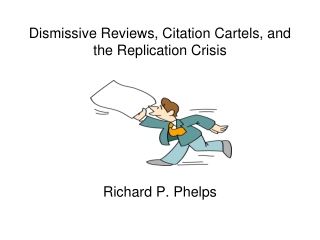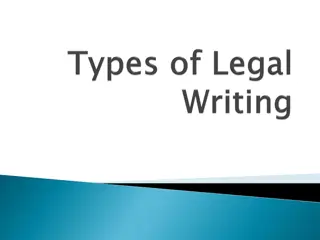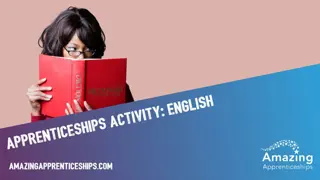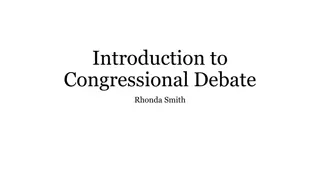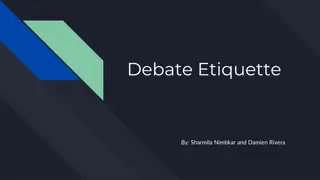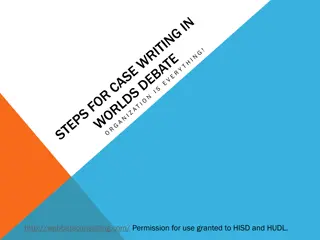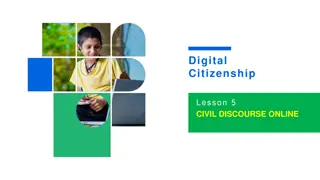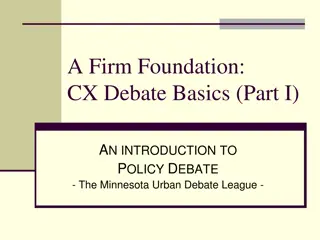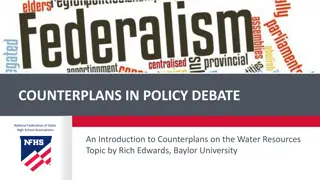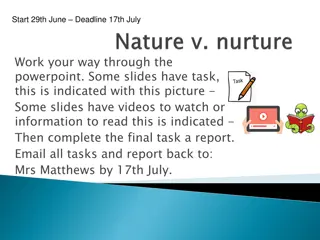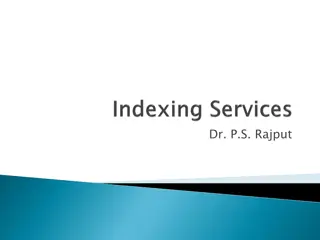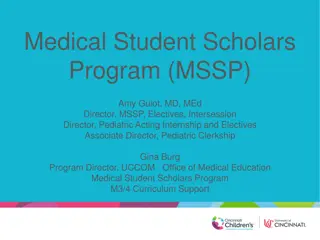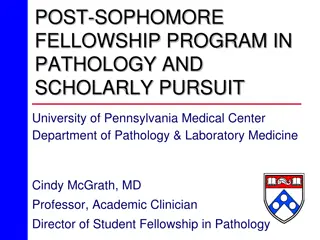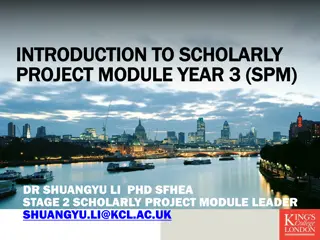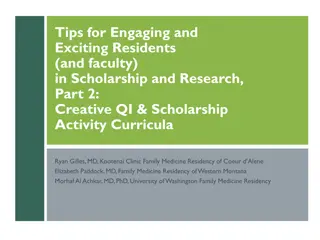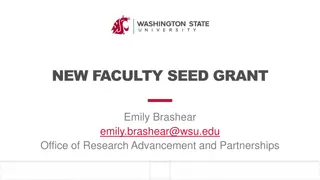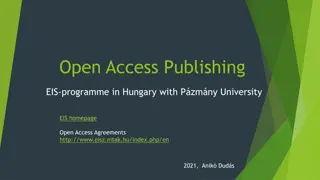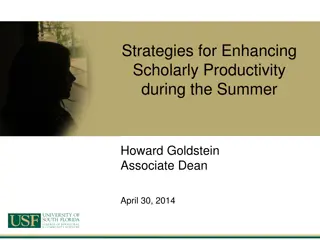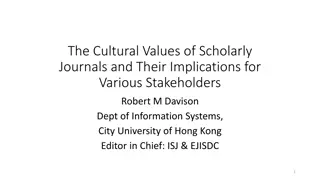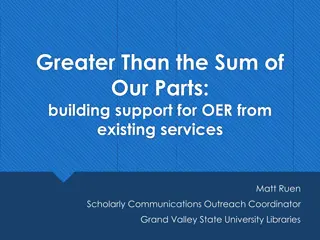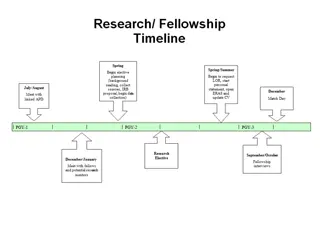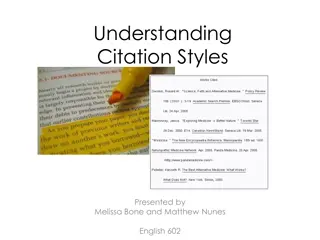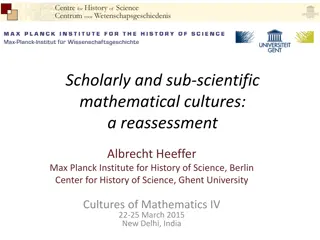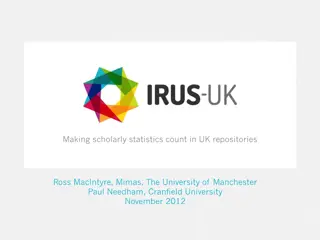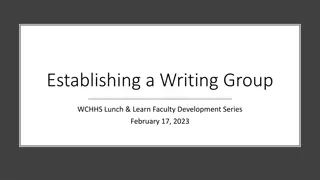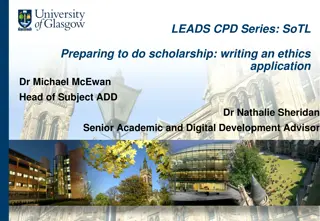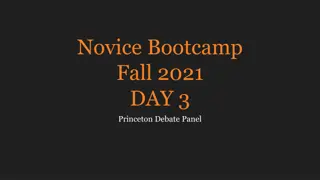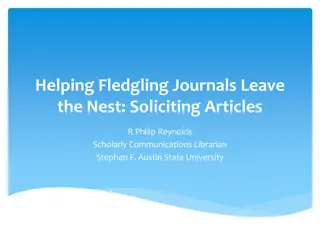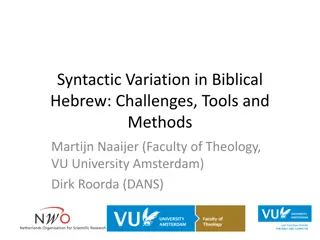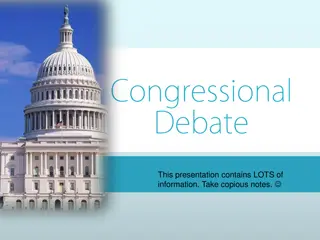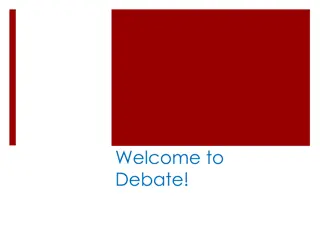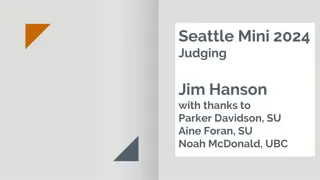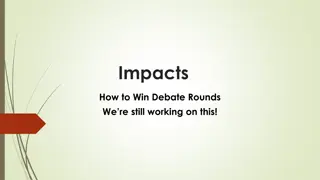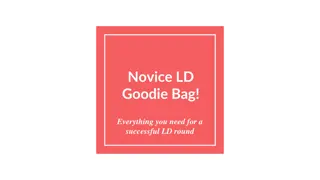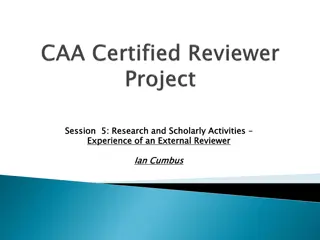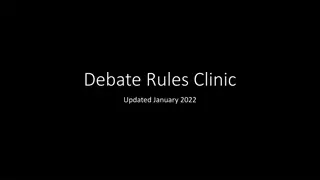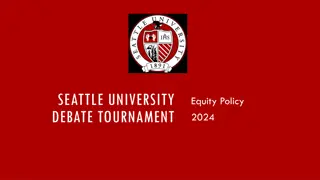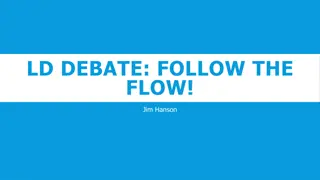Dismissive Reviews, Citation Cartels, and the Replication Crisis
The study delves into the replication crisis in research, citing factors influencing research credibility such as sample size, effect size, and financial interests. It highlights issues like gaming the system, P-hacking, and data sharing reluctance. The growth of Metascience as a response to these c
0 views • 45 slides
The Purpose and Methodology of Scholarly Legal Writing
Scholarly legal writing serves to advance knowledge within specific fields by offering in-depth analysis, historical context, and contributing new insights to legal literature. It distinguishes itself from practice-related writing by focusing on research, surveying existing knowledge, and engaging i
3 views • 22 slides
The Great Apprenticeship Debate: For or Against Apprenticeships
The lesson involves a debate on the merits of apprenticeships, with arguments for and against discussed. Students are encouraged to consider factors such as cost, time commitment, social life, workplace experience, and more. Debate rules emphasize the importance of using evidence, respecting others,
2 views • 7 slides
Essentials of Congressional Debate: Rules, Procedures, and Norms
Explore the key components of Congressional Debate including the types of legislation, preparation guidelines, contest norms, and dress code expectations. Learn about bills, resolutions, and constitutional amendments, and understand the importance of courteous behavior, proper attire, and effective
0 views • 27 slides
Mastering Debate Etiquette: A Comprehensive Guide
Enhance your debate skills with this comprehensive guide on debate etiquette. Learn about pre-debate introductions, flipping the coin, understanding judge paradigms, and in-round etiquette. Discover essential tips for interacting with opponents, making strategic decisions, and maintaining respect th
2 views • 8 slides
Debate Framework for Capitalism vs. Communism
This debate framework presents a structured approach for arguing in favor of or against the motion that capitalism is superior to communism. It includes sections such as introduction, statement of the motion, definitions, and criteria or principles to guide the debate. Emphasis is placed on developi
0 views • 9 slides
Civil Discourse Online in Digital Citizenship Lesson 5
This lesson focuses on civil discourse online through a class debate about whether there should be homework assignments in school. Students engage in a structured Twitter debate, showcasing pros and cons in a respectful manner. Reflections on the debate encourage understanding differing viewpoints a
3 views • 10 slides
An Introduction to Policy Debate: Understanding CX Debate Basics
Policy debate, also known as CX debate, involves structured arguments on policy topics. Teams of two students engage in constructive speeches and rebuttals, focusing on an annual resolution. Round structures, differences between constructive and rebuttal speeches, and debate strategies are key compo
0 views • 18 slides
Counterplans in Policy Debate
Counterplans in policy debate are alternative policies presented by the negative team that compete with the affirmative plan. They must be specific, competitive, and mutually exclusive to offer net benefits over the affirmative proposal. Nontopicality and competitiveness are debated aspects, with co
0 views • 10 slides
The Debate of Nature vs. Nurture in Personal Development
The nature vs. nurture debate in personal development explores the influence of genetic and biological factors (nature) compared to social, economic, and environmental factors (nurture). It raises questions on whether genetics or environment plays a stronger role in shaping behaviors, intelligence,
0 views • 14 slides
Indian Citation Index (ICI) - Enhancing Access to Indian Scholarly Content
Indian Citation Index (ICI) is a multidisciplinary research platform developed by The Knowledge Foundation. With over 1000 scholarly journals, ICI aims to bridge the gap between content sources and users, providing online access to a wide range of Indian publications in various fields. The database
0 views • 10 slides
Medical Student Scholars Program Overview
The Medical Student Scholars Program (MSSP) offers motivated medical students opportunities for in-depth exploration of various specialties, including clinical experiences, research projects, scholarly work, and leadership development over four years. The program features tracks in cardiovascular me
0 views • 21 slides
Post-Sophomore Fellowship Program in Pathology and Scholarly Pursuit at University of Pennsylvania Medical Center
Student Fellowship Program in Pathology at University of Pennsylvania Medical Center offers a unique work-study experience for students interested in pursuing a career in pathology. The year-long program includes rotations in Anatomic and/or Clinical Pathology, a dedicated research project, and tail
2 views • 4 slides
Scholarly Project Module in MBBS Year 3 Overview
Scholarly Project Module (SPM) in MBBS Year 3 is a pivotal module focusing on developing students into doctors as scholars and scientists. It includes a project-based approach, essential skills development, and assessments like a 3000-word essay. The module runs in the first semester and covers vari
0 views • 11 slides
Insights from Surveys on Peer Review & Peer Feedback in Scholarly Communication
Results from surveys on peer review and peer feedback provide valuable insights into the demographics, general attitudes, and major challenges faced in scholarly communication. The data reveals respondent demographics, overall satisfaction with peer review systems, and prevalent problems in current
0 views • 13 slides
Enhancing Engagement in Scholarly Activities and Research in Family Medicine Residency Programs
Explore strategies and challenges in promoting scholarly activities and research participation among residents and faculty in family medicine residency programs. Learn about ACGME/RRC requirements, importance of research in primary care, and creative QI and scholarship curricula. Discover insights o
0 views • 25 slides
Washington State University New Faculty Seed Grant Program
Encouraging new junior-level faculty at Washington State University to develop research, scholarly, or creative programs with the potential for sustained professional growth and external support. Eligible applicants include junior-level faculty appointed on or after May 16, 2019. The program offers
1 views • 26 slides
Open Access Publishing and EIS Programme at Pázmány University: Empowering Research and Scholarly Communication
Discover the advantages of Open Access (OA) publishing and how researchers benefit from immediate accessibility, increased discoverability, and global readership. Learn about the EIS Programme at Pázmány University, a member institution dedicated to providing essential electronic resources for hig
0 views • 12 slides
Strategies for Enhancing Scholarly Productivity
Enhance your scholarly productivity with effective strategies like creating a routine time for writing, setting realistic goals, organizing your writing space, and getting started with daily writing habits. Maximize your time wisely and prioritize writing tasks to achieve your summer goals.
5 views • 27 slides
Scholarly Journal Cultural Values and Stakeholder Implications
Scholarly journals like ISJ and EJISDC embody cultural values that shape behaviors and interactions among stakeholders. This keynote delves into the significance of diversity in editorial boards, care for stakeholders, trust, integrity, community, and the types of research published. An emphasis is
0 views • 23 slides
Building Support for OER at GVSU: A Collaborative Initiative
Embodying values, seizing opportunities, and encouraging innovation, Grand Valley State University's Libraries, Scholarly Communications, and other support services join forces in the OER Initiative. Motivated by enhancing research, teaching, and technology support, the initiative receives backing f
1 views • 25 slides
Residency Scholarly Endeavors and Requirements at OHSU
Residency at OHSU entails engaging in two scholarly endeavors throughout the program, including first-author responsibilities for various academic presentations and publications. The structured timeline outlines activities from July to July, such as training, mentor meetings, manuscript submissions,
0 views • 12 slides
Importance of Understanding Citation Styles in Academic Writing
Understanding different citation styles is crucial for academic writing across various disciplines. It helps students comprehend the role of citation in different communities, research methodology, and the value of knowledge in diverse fields. Citation practices in the humanities emphasize authority
0 views • 12 slides
Reassessing Scholarly and Sub-Scientific Mathematical Cultures
Scholarly and sub-scientific mathematical cultures are reevaluated through the works of Jens Hoyrup, focusing on the organized nature of sub-scientific knowledge. The distinction between theoretical and practical knowledge, applications to mathematical cultures, and misconceptions related to the sup
0 views • 53 slides
Enhancing Scholarly Statistics in UK Repositories
The IRUS-UK project aims to standardize and improve the collection and reporting of usage statistics for UK institutional repositories. By enabling sharing of reliable and comparable statistics, IRUS-UK facilitates benchmarking and demonstrates the value of repositories in scholarly dissemination.
0 views • 18 slides
Establishing a Writing Group for Faculty Development in WCHHS Lunch & Learn Series
Engage in a dynamic writing group to foster collaboration, receive feedback, and enhance productivity. Explore the benefits of accountability, safe feedback, and breaking down frustrations while celebrating accomplishments. Dive into logistics, including duration variability, writing retreat options
0 views • 9 slides
Ethics Application: Scholarly Preparation & Considerations in Educational Research
Explore the importance of scholarly preparation for writing an ethics application in educational research, incorporating adequate preparation, ethical considerations in SoTL, BERA guidelines, and ethical considerations such as risk, consent, and confidentiality.
0 views • 14 slides
Mastering Rebuttal Strategies in Debate: A Comprehensive Guide
Discover effective rebuttal techniques in debate such as nitpicking, mitigation, and offensive rebuttals. Learn how to strategically undermine your opponent's arguments by challenging their burdens, reducing the impact of their points, and presenting counter-arguments that strengthen your position.
0 views • 23 slides
Strategies for Soliciting Articles in Scholarly Publishing
Scholarly publishing entails soliciting articles effectively to nurture fledgling journals. This involves utilizing diverse methods such as sending questionnaires, posting flyers, and leveraging traditional publisher services. Editors play a vital role in initiating the process early and engaging mu
0 views • 16 slides
An Overview of Debate: Propositions, Teams, and Formats
Debate is a regulated discussion between two matched sides discussing a proposition, with the affirmative arguing for change and the negative defending the status quo. The standard debate format involves constructive arguments followed by rebuttals from both sides. The roles in a debate include the
0 views • 47 slides
Challenges of Syntactic Variation in Biblical Hebrew
Linguistic variation in Biblical Hebrew has sparked a heated debate since 2000, challenging traditional dating methods and assumptions. The Structure Debate delves into syntactic variation and the use of the participle, while considering the differing language in Early Biblical Hebrew (EBH) and Late
0 views • 21 slides
Congressional Debate in the United States
This presentation delves into the nuances of Congressional Debate, a format modeled after the United States Congress where students debate proposed federal legislation. It covers key aspects such as types of legislation, vocabulary, roles like Senators/Representatives and Presiding Officer, parliame
0 views • 49 slides
Debate Formats Explained: CX vs. LD
Explore the world of debate with an overview of the CX (Cross-Examination) and LD (Lincoln-Douglas) formats. CX involves policy debates with teams advocating for and against resolutions related to US federal government policies, while LD focuses on one-on-one debates on values and philosophy. Discov
0 views • 11 slides
Tips for Being a Supportive and Equitable Debate Judge
When judging a debate, it is crucial to be supportive, equitable, and respectful of all participants. Providing opportunities for debaters to state their pronouns and important information, avoiding favoritism, and embracing diversity are key aspects of being a good judge. Actively listening, taking
1 views • 39 slides
Mastering Impact Calculus in Debate Rounds
Understand the importance of impacts in debate rounds, learn how to win by emphasizing impacts, compare economic suffering vs. illness during Covid-19, explore various impact comparisons like Economy vs. Environment, and grasp the significance of matters and comparisons in impacting. Practice your s
0 views • 18 slides
Everything You Need to Know About Novice LD Debate
In Novice LD Debate, participants like Abraham Lincoln and Stephen Douglas engage in one-on-one debates following specific time allocations for affirmative and negative arguments. The resolution defines the topic to be debated, such as propositions of fact, value, or policy. Debate resolutions chang
0 views • 34 slides
Research and Scholarly Activities External Reviewer Experience
Explore the experience of an external reviewer in evaluating research and scholarly activities within an educational institution. Key aspects include assessing research strategy, scholarly productivity, and student engagement in research. Examination of policies, strategy development, resource alloc
0 views • 10 slides
Idaho Debate Rules Clinic Overview
An overview of the Idaho Debate Code, emphasizing the importance of following the rules, proper judging procedures, evidence availability, and general guidelines for both judges and debaters. The presentation highlights key resources, such as the Idaho Rules Manual and Judge Resource Website, and st
1 views • 25 slides
Seattle University Debate Tournament Equity Policy 2024
Seattle University Debate Tournament Equity Policy 2024 outlines guidelines for respectful behavior among participants, emphasizing the importance of treating others with respect and care regardless of differences in identity. The policy prohibits disparaging comments or actions based on non-politic
0 views • 12 slides
Flowing Better: Mastering the Art of Note-Taking in Debate
Improve your debate skills by learning how to flow arguments effectively during a debate. Enhance your understanding of taglines, claims, and sources to create impactful contentions. Utilize abbreviations and shorthand to streamline your note-taking process and respond strategically to opponents. Sh
0 views • 42 slides
